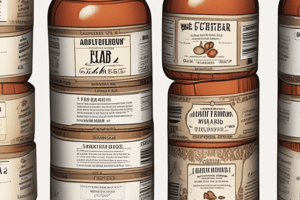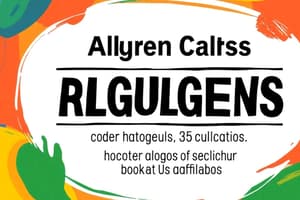Podcast
Questions and Answers
What are the top three food allergies?
What are the top three food allergies?
- Milk, wheat, shellfish
- Peanut, tree nut, egg (correct)
- Kiwi, soy, fish
- Mustard, sesame, celery
The Food Information (Northern Ireland) Regulations 2014 require businesses to provide allergy information for unpackaged foods.
The Food Information (Northern Ireland) Regulations 2014 require businesses to provide allergy information for unpackaged foods.
True (A)
What is the purpose of the "Allergy Advice Box?"
What is the purpose of the "Allergy Advice Box?"
- To give a summary of the food's nutritional value.
- To explain how to contact the food manufacturer.
- To provide a list of all ingredients in a food product.
- To highlight where allergens are emphasized in the ingredients list. (correct)
What are the 14 allergens listed in Annex II of the Food Information (NI) Regulations 2014?
What are the 14 allergens listed in Annex II of the Food Information (NI) Regulations 2014?
The Food Information (NI) Regulations 2014 cover allergen cross contamination.
The Food Information (NI) Regulations 2014 cover allergen cross contamination.
What is a key requirement for food businesses to ensure when dealing with allergens?
What is a key requirement for food businesses to ensure when dealing with allergens?
What are the three main types of enforcement methods used by the Food Information (NI) Regulations 2014?
What are the three main types of enforcement methods used by the Food Information (NI) Regulations 2014?
Flashcards
Food Allergy
Food Allergy
A serious reaction to a specific food, that can cause immediate and potentially fatal symptoms.
Food Information (NI) Regulations 2014
Food Information (NI) Regulations 2014
Regulations in Northern Ireland that mandate specific food labeling requirements to protect consumers with allergies. It expanded the previous General Labelling Regulation (2000/13/EC) to include more food types and ways of providing allergen information.
Allergen Labeling (emphasis)
Allergen Labeling (emphasis)
Allergens in ingredients lists need to be highlighted or emphasized in a different way compared to the regular text used for non-allergenic ingredients.
The Big 14
The Big 14
Signup and view all the flashcards
Pre-packed food
Pre-packed food
Signup and view all the flashcards
Non-pre-packed food
Non-pre-packed food
Signup and view all the flashcards
Cross-contamination
Cross-contamination
Signup and view all the flashcards
Improvement notices
Improvement notices
Signup and view all the flashcards
Study Notes
Food Information Regulations (NI) 2014
- Understand food safety and consumer protection, focusing on allergens.
- What information is required on food labels (2014 Regulations).
- Food allergies/intolerances can cause immediate and fatal illness.
Special Dietary Advice - Allergens
- Food allergy symptoms include immediate and even fatal reactions.
- Food labels help people with allergies/intolerances make safe food choices.
FSA in NI/Safe Food Allergy Research
- Dining out risks are a key concern for parents of children with food allergies/intolerances.
- Top food allergies are peanut, tree nut, and egg; kiwi is also relatively common.
- Risk of reaction outside the home is high.
- Inadequate information and cross-contamination are significant risks.
- Food sensitivity consumers dine out as frequently as non-sensitive consumers.
Food Labelling Changes
- Moved from General Labelling Regulation (2000/13/EC) to Food Information (NI) Regulations (2014).
- Three-year transition period (13 December 2014).
- Existing pre-packed food requirements retained, but new emphasis on allergenic foods in ingredient lists.
- New requirements for allergy information on unpackaged foods.
Changes in Allergen Labelling
- Allergens must be emphasized in ingredient lists.
- Examples of allergens: peanuts, nuts, milk, soya, mustard, molluscs, lupin, eggs, fish, crustaceans, cereals containing gluten, sesame, celery.
- Sulphur Dioxide.
Labelling of Allergens
- Allergens must be clearly listed in the ingredients list with clear reference to the substance/product.
- Allergenic ingredients should be emphasized with font, styling, or background color different from other ingredients.
- In cases of several ingredients from a single allergen, the labelling should specify this.
Voluntary Information
- The commission can introduce new rules concerning unintentional presence of allergens/intolerances in food.
- Precautionary warning labels for allergens ("may contain") can be used for both pre-packed and non-pre-packed foods.
Non-Pre-packed Food
- New requirements for allergen information for non-pre-packed foods, and foods provided pre-packed for direct sale.
- Oral allergy information is permitted (with clear indication of ability to obtain this information).
Cross-Contamination
-
The 2014 regulations only cover intentionally added allergens, however, other cross-contamination controls should be considered.
-
Consideration should be made for food storage, preparation, handling, cooking, equipment, and staff practices.
Review Information
- Food businesses need accurate, consistent, and verifiable allergen information and systems.
- Regular reviews of ingredient information are necessary.
- Accurate allergen information is dependent on all aspects of labelling, staff training, updates for consumers, and any ingredient changes.
Offences Under FIR
- Sale of loose food or pre-packed food without allergen information is an offence.
- Improvement notices and appeals processes are available for non-compliance.
- Criminal sanctions may be imposed for significant breaches in food allergen safety.
Changes to Enforcement
- Improvement notices to outline the necessary changes to reach compliance within a timeframe.
- Appeals against an improvement notice to a court of summary jurisdiction.
- Criminal sanctions for food safety breaches concerning allergen provisions.
Allergen Activity (Example)
- Example list of ingredients (Lasagne): lasagne sheets, minced beef, tomatoes, onion, carrot, garlic, oregano, white wine, chicken stock, olive oil, salt.
- Identify the allergenic ingredients.
Studying That Suits You
Use AI to generate personalized quizzes and flashcards to suit your learning preferences.




